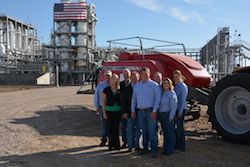 Last week Abengoa’s cellulosic ethanol biorefinery went online and is expected to produce 25 million gallons of advanced ethanol per year as well as 21 MW of bioenergy. But how exactly does the corn and wheat residue get from the fields to the biorefinery in a economical and efficient way? Enter Pacific Ag.
Last week Abengoa’s cellulosic ethanol biorefinery went online and is expected to produce 25 million gallons of advanced ethanol per year as well as 21 MW of bioenergy. But how exactly does the corn and wheat residue get from the fields to the biorefinery in a economical and efficient way? Enter Pacific Ag.
The company was founded by Bill Levy in 1998 and began by baling residue for growers and using the biomass for animal feed both in the U.S. and internationally. It was a natural progression for Pacific Ag to get involved in cellulosic production in the U.S. and to become a major supplier to the industry.
I asked Levy to talk about their residue removal model. He noted that since their inception, they have always focused on having a balanced residue program for growers and they are finding value for those products for them. So taking their successful model from the Northwest and applying it to the Midwest was a good fit. “The fundamentals of having residue removed on a timely basis and in a sustainable way is really the same,” explained Levy. Today they are in California, North Carolina, Iowa, Kansas and he says they have innovated to become “energy balers” because of the new bioenergy market for residue.
It’s very easy for a grower to work with Pacific Ag. Levy explained that if a grower has five circles of corn, for example, he/she can call Pacific Ag after harvest and they will schedule a time for them to come in and bale the biomass. “We have a very predictable payment schedule. You get 50 percent when the stack is created and 50 percent when the stack moves,” explained Levy. He said they also have a great paperwork system to track all the bales, the tons and their movement.
 He added that what’s nice is to have growers contact them early to let them know how many circles they want harvested because they put so much effort into planning for the season but a grower can add circles after he sees the value of Pacific Ag and his neighbor can call after he harvests his field when he sees the significant revenue stream the biomass provides others.
He added that what’s nice is to have growers contact them early to let them know how many circles they want harvested because they put so much effort into planning for the season but a grower can add circles after he sees the value of Pacific Ag and his neighbor can call after he harvests his field when he sees the significant revenue stream the biomass provides others.
“And I think as the world starts to look at renewable energy, I think agriculture is going to be the benefactor,” added Levy.
Pacific Ag is looking for growers of rice, wheat, corn and other biomass crops who are interested in working with them. As the markets for biomass continue to explode, Pacific Ag is ready to be the partner to help make the growers who plant the bioenergy crops, successful.
Learn more about Pacific Ag and how to become involved in the biomass energy revolution by listening to my interview with Bill Levy: Interview with Bill Levy, Pacific Ag
